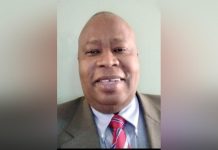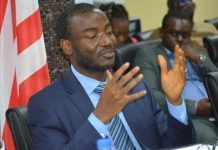Africa-Press – Liberia. — Says UN must lead by exampleForeign Minister Sara Beysolow Nyanti has called on the UN to lead by example and adhere to the principles of inclusivity and equity it promotes to other nations.
She has highlighted the importance of reforming the UN Security Council to ensure fair and equitable representation, particularly for African nations.
In a GZERO Media interview in the U.S. after the UN General Assembly’s conclusion, Minister Nyanti emphasized the urgent necessity for reform within the UN Security Council, with a specific focus on improving representation for African nations. She underscored the importance of the UN setting a positive example and upholding the principles it encourages other entities to follow.
“The UN needs to lead by example, and the UN needs to stand by the principles that it holds others accountable to,” the minister said. “You can’t be telling nations, least developing countries, that they must be inclusive and that you must have equitable systems and all of these things when the highest body at the UN is very shrewd in terms of who has a voice and who can say what happens around the world and then can choose not to live by what they are telling others to do.
“I’m sorry, it doesn’t work anymore. All of us need to be held accountable,” she indicated.
The Minister emphasized that the current structure of the Council, with what many considered its antiquated mechanisms and colonial heritage, hinders Africa’s ability to influence global discussions on crucial issues such as conflict resolution and sustainable development.
“I think the time is right for the strong caps because many African countries have had different experiences that have led many of us to believe that the current configuration for global governance on peace and security is no longer fit for purpose,” Minister Nyanti said. “The needs of countries during conflicts, post conflicts, are not being met in line with the expectations, and voices must be heard. We talk about leaving no one behind, and if the countries that are affected don’t think they have just and equitable representation legends, there’s a problem.”
The Foreign Minister’s call for reforms within the UN system came after President Joseph Nyuma Boakai, Sr., officially launched Liberia’s bid for a non-permanent seat on the Security Council for the 2026-2027 term.
President Boakai, himself, had earlier urged the UN institute reforms that will make the global body an inclusive institution that gives voices to other countries and peoples.
Minister Nyanti argued during the interview that African countries deserve permanent seats on the Security Council to better reflect the continent’s role in global governance and resource management.
“I know that they [African countries] should be given permanent seats because Africa is the source of most of the resources of the world, and Africa is very critical to global governance and multilateralism,” she said. “You cannot have a rules-based world order that does not reflect all of the world’s people adequately, so it needs to happen, and if permanent seats are selected, we have the African Union. The African Union will decide how the African Union is represented at the UN Security Council.”
The United Nations Security Council (UNSC) is one of the six principal organs of the United Nations (UN) and has the responsibility of ensuring international peace and security, recommending the admission of new UN members to the General Assembly, and approving any changes to the UN Charter. It consists of permanent members, including China, France, Russia, the United Kingdom, and the United States, as well as non-permanent members on rotation like Algeria, Ecuador, Guyana, Japan, Malta, Mozambique, Sierra Leone, Slovenia, South Korea, and Switzerland. The UN was established in 1945 after World War II to replace the ineffective League of Nations. It was a global tool to restore world order.
However, Minister Nyanti emphasized the need for a comprehensive overhaul of the Security Council’s structure and functioning, not just focusing on veto powers but on the system’s overall effectiveness in addressing contemporary challenges.
“The system we have today, the solutions and the tools were made back after the war, war two. I mean, they are not fit for purpose for the current world that we are living in as I believe very strongly that we need to go back to the beginning. Go back to the foundation, look at what’s there and what needs to be overhauled and reformed,” the minister said. “We need to examine the entire structure, principles, and functioning of the Security Council.”
She added, “It is not just the matter of seats, but how will you be seated at the table, and it’s not just the matter of speaking, will you be heard at the table? It’s not a matter of being heard; will there be actions at the table?”
She indicated further, “So there’s a lot to look at, and I think just talking about veto and non-veto is not the issue. It’s about overhauling the entire system. I would like to be a part of a process that reviews the entire peacekeeping operation around the world.”
Meanwhile, other leaders at the recent UN General Assembly echoed these sentiments, emphasizing the urgent need for the Security Council to evolve to better meet the demands of a changing world.
For More News And Analysis About Liberia Follow Africa-Press






